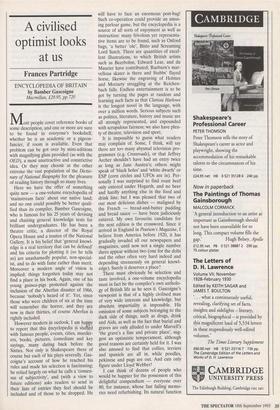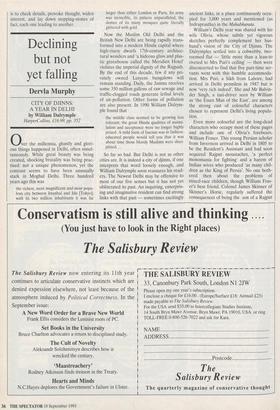A civilised optimist looks at us
Frances Partridge
ENCYCLOPEDIA OF BRITAIN by Bamber Gascoigne Macmillan, £29.95, pp.720 Most people covet reference books of some description, and one or more are sure to be found in everyone's bookshelf, whether he is an academic or a pigeon- fancier, if room is available. Even that problem can be got over by mini-editions with magnifying glass provided (as with the OED), a most unattractive and constrictive idea. Or they may chooe at the other extreme the vast population of the Dictio- nary of National Biography for the pleasure of reading history through so many lives.
Here we have the offer of something quite new — a one-volume encyclopedia of `mainstream facts' about our native land; and no one could possibly be better quali- fied than its compiler, Bamber Gascoigne, who is famous for his 25 years of devising and chairing general knowledge tests for brilliant undergraduates. He has been a theatre critic, a director of the Royal Opera House and a trustee of the National Gallery. It is his belief that 'general knowl- edge is a real territory that can be defined' and his criteria for plotting it (so he tells us) are unashamedly popular, non-special- ist, and to do with fame rather than merit. Moreover a modern angle of vision is implied; things forgotten today may not find a place in his book. Again, one of his young guinea-pigs protested against the inclusion of the Aberfan disaster of 1966, because 'nobody's heard of it'. Yet, since those who were children of six at the time will remember the horror, and they are now in their thirties, of course Aberfan is rightly included.
However modern in outlook, I am happy to report that this encyclopedia is stuffed with famous people, events, cities, murder- ers, books, pictures, Comedians and key sayings, many dating back before the Sixties. Not only is Shakespeare there of course but each of his plays severally. Gas- coigne's account of how he reached his rules and made his selection is fascinating; he relied largely on what he calls a 'consen- sus of subjectivity', and (with a view to future editions) asks readers to send in their lists of entries they feel should be included and of those to be dropped. He
will have to face an enormous post-bag! Such co-operation could provide an amus- ing parlour game, but the encyclopedia is a source of all sorts of enjoyment as well as instruction: many frivolous yet representa- tive items are to be found, such as Oxford bags, 'a better 'ole', Bisto and Screaming Lord Sutch. There are quantities of excel- lent illustrations, to which British artists such as Beerbohm, Edward Lear, and du Maurier have contributed; Raeburn's mar- vellous skater is there and Stubbs' flayed horse, likewise the engraving of Holmes and Moriarty struggling at the Reichen- bach falls. Endless entertainment is to be got by turning the pages at random and learning such facts as that Clarissa Harlowe is the longest novel in the language, with over a million words. Serious subjects such as politics, literature, history and music are all strongly represented, and expounded with scrupulous fairness; we also have plen- ty of theatre, television and sport.
It is impossible to guess what readers may complain of. Some, I think, will say there are too many abysmal television pro- grammes (e.g. Crossroads), or that Jeffrey Archer shouldn't have had an entry twice as long as Jane Austen's; others might speak of 'black holes' and 'white dwarfs' or ESP (corn circles and UFOs are in). Per- sonally I was surprised to find roast beef only entered under Hogarth, and no beer and hardly anything else in the food and drink line; but I was pleased that two of our most delicious dishes — maligned by the French — bread-and-butter pudding and bread sauce — have been judiciously entered. My own favourite candidate for the next edition is the crossword. Since it arrived in England in Pearson's Magazine, I believe from America before 1920, it has gradually invaded all our newspapers and magazines, until now not a single number dares appear without two (one for the dolts and the other often very hard indeed and depending strenuously on general knowl- edge). Surely it deserves a place?
There must obviously be selection and taste involved, a one-volume encyclopedia must in fact be the compiler's own antholo- gy of British life as he sees it. Gascoigne's viewpoint is that of a highly civilised man of very wide interests and knowledge, but absolute impartiality is impossible. His omission of some subjects belonging to the dark side of things, such as drugs, drink and Aids, as well as the fact that burial and graves are only alluded to under Marvell's 'the grave's a fine and private place', sug- gest an optimistic temperament, although good reasons are certainly held for it. I was also amused to find that collies, terriers and spaniels are all in, while poodles, pekinese and pugs are out. And cats only figure under Lloyd Webber!
I can think of dozens of people who would be happier for the possession of this delightful compendium — everyone over 80, for instance, whose fast failing memo- ries need refurbishing. Its natural function
is to check details, provoke thought, widen interest, and lay down stepping-stones of fact, each one leading to another.



































































 Previous page
Previous page